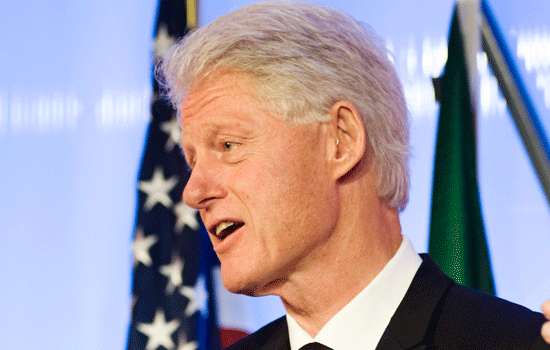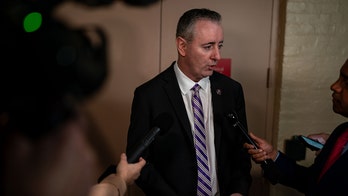
Former President Bill Clinton acknowledges applause after being awarded the Sons of Italy Foundation's 2010 Lifetime Achievement Award for Public Service during the groups annual national education and leadership awards gala in Washington, Wednesday, May 26, 2010. (AP)
Like an aging sports star who can't stay away from the game, Bill Clinton's direct role in the firestorm over President Obama's job offer to a lawmaker for a political favor has raised questions about whether the former president was used and abused by a cynical administration or whether he took advantage of the White House to burnish his legacy.
At the behest of White House Chief of Staff Rahm Emanuel, Clinton tried last summer to persuade Pennsylvania Rep. Joe Sestak to abandon his primary challenge to Sen. Arlen Specter by offering an executive branch post.
But in perhaps a sign of Clinton's fading influence, Sestak turned the offer down and whipped Specter in the primary last week.
"It's very clear that President Clinton doesn't want to leave politics but more importantly that the White House wanted some sort of plausible deniability," Rep. Darrell Issa, R-Calif., who is calling for an FBI investigation, told Fox News on Friday.
Issa added that President Nixon had deniability from the plumbers in the Watergate scandal that ultimately brought down his presidency until he became part of the coverup.
"At this point, 10 weeks later, lots of witness tampering, or at least witness interrogation by people who are self serving, we're beginning to go down that same road," he said. "It's now time for the president to say enough is enough, I promised to have higher integrity and that will include having someone on the outside tell us what we did right or wrong."
Others didn't see anything wrong with Clinton's actions.
"This is the way politics operates and almost all former presidents, key public leaders, party leaders do this for the president," Larry Sabato, director of the University of Virginia Center for Politics, told Fox News.
"Also keep in mind, this is an unusual administration," he said. "It's a merger of the Obama wing and Clinton wing. We've seen that since the Cabinet was formed. Yes, former President Clinton does political duties for Obama and Rahm Emanuel."
Given the political connections among those involved in the controversy, it made sense for Clinton to act as an intermediary. When Clinton was president, Emanuel served as his political director. And as president Clinton promoted Sestak to vice admiral and made him his director of defense policy.
Emanuel has also been credited for easing tensions between Obama and Clinton after Hillary Clinton's loss to Obama in the 2008 Democratic presidential contest.
Obama appointed Hillary Clinton as secretary of state and he has appeared with Bill Clinton at least 11 times since he took office.
But perhaps the biggest indicator that Clinton is seeking to add to his political legacy is his efforts in recent months to help Democrats avoid the failings of his presidency. In November, he rallied anxious Senate Democrats around Obama's health care plan after his attempt in 1993 collapsed. He has also been active on the campaign trail for Democrats facing a toxic environment for incumbents in this year's midterm elections.
Clinton, who lost control of both chambers in Congress in 1994, is trying to help Democrats avoid a similar fate this year. He has campaigned for Mark Critz, who won last week's special election to replace the late Rep. John Murtha, and Sen. Blanche Lincoln, who is in a runoff for the Democratic nomination.




